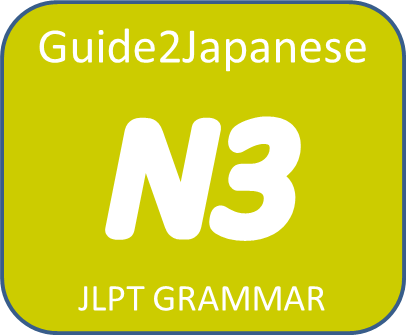JLPT N3 GRAMMAR:~こそ
| ~こそ | |
| 意味 | |
| 接続 | 名詞/動詞のテ形/から/に+こそ |
Meaning: for sure ( emphasize preceding word); precisely; definitely; the very~
こそ is a particle that emphasizes a word or phrase.
Formation:
名詞/動詞のテ形/から/に+こそ
Example sentences:
- 「どうぞよろしく」「こちらこそ」
- `Dōzo yoroshiku’`kochira koso’
- “Nice to meet you” “same here”
- “मिलके अच्छा लगा” “मुझे भी”
- 今年こそ合格したい。
- Kotoshikoso gōkaku shitai.
- I want to pass this year.
- मैं इसी साल पास होना चाहता हूं।
- 困ったときこそ助け合おう。
- Komatta toki koso tasukeaou.
- Let’s help each other when in trouble.
- मुसीबत आने पर तो एक-दूसरे की मदद करें।
- 言葉は実際に使ってみてこそ身につくのだ。
- Kotoba wa jissai ni tsukatte mite koso mi ni tsuku noda.
- Words can only be mastered by actually using them.
- शब्द केवल वास्तव में उनका उपयोग करने से ही अच्छे किये जा सकते है।
- 材料や調味料にもこだわってこそ、プロの料理人と言えるのではないか。
- Zairyō ya chōmiryō ni mo kodawatte koso, puro no ryōrijin to ieru node wanai ka.
- When one is very particular about the ingredients and seasonings, then only he is called as a professional cook, isn’t it?
- सामग्री और सीज़निंग के बारे में चयनात्मक होनेवालाही, एक पेशेवर कुक कहा जाता है, है ना।
- 親は子どものことを心配しているからこそ叱るのだ。
- Oya wa kodomo no koto o shinpai shite irukara koso shikaru noda.
- Parents scold because they are worried about their children.
- माता-पिता अपने बच्चों के बारे में चिंतित रहते है इसलिएही डाटते है।
- 若者にこそ、古い伝統文化に触れてもらいたい。
- Wakamono ni koso, furui dentō bunka ni furete moraitai.
- I want only young people to experience old traditional culture.
- मैं चाहता हूं कि युवा भी पुरानी पारंपरिक संस्कृति का अनुभव करें।



